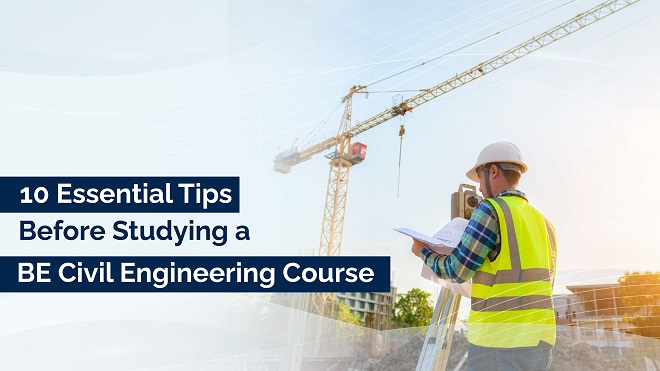10 Essential Tips Before Studying a BE Civil Engineering Course

Civil engineering is one of India’s oldest and most popular branches. It deals with the design, construction, and maintenance of various structures such as buildings, bridges, roads, dams, and airports. Civil engineers are responsible for creating safe, sustainable, and efficient infrastructure for the society.
If you are interested in pursuing a civil engineering degree from BE civil engineering colleges in Mumbai, you’ve come to the right place. Here are 10 essential tips you should know before studying a BE civil engineering course.
BE in Civil Engineering: Overview
Before we get into the tips, check out the table below to get an overview of the civil engineering courses at BE colleges in India.
| Course Name | Bachelor of Engineering in Civil Engineering |
| Duration | 4 years |
| Level | Undergraduate |
| Mode of Examination | Semester System |
| Eligibility Criteria | 50% or more in 10+2 with PCM |
| Admission Process | Merit/ Entrance Test |
| Common Entrance Tests | JEE Main, JEE Advanced, MHT CET, KCET, etc |
The 10 Essential Tips Before Joining a BE Civil Course
Here’s what you’ve been waiting for, the 10 important tips that you need to keep in mind before enrolling in a BE Civil Engineering program:
1. Know the eligibility criteria and admission process
The eligibility criteria and admission process to get into BE civil engineering colleges in Mumbai and elsewhere in India varies from college to college. However, scoring 50% marks in aggregate or equivalent grade in 10+2 or equivalent examinations with Physics, Chemistry, and Mathematics as compulsory subjects is mandatory.
Some colleges conduct their own entrance exams, while others, like Terna Engineering College, accept scores of national or state-level exams such as the MHT CET. Check the official website of the college you are interested in and apply accordingly.
2. Choose the right college and branch
There are many engineering colleges in Navi Mumbai and the rest of India that offer BE civil engineering courses. However, not all of them are equally good in terms of quality of education, faculty, infrastructure, placement, and reputation.
You should also consider the branch or specialisation of civil engineering that you want to pursue. There are various sub-disciplines of civil engineering such as:
- Structural engineering
- Geotechnical engineering
- Environmental engineering
- Transportation engineering
- Water resources engineering, etc.
Hence, it is important to research and compare different BE civil engineering colleges in Mumbai and elsewhere before making a decision to make sure all these factors align with your interests and career goals.
3. Prepare well for the curriculum and exams
The curriculum of a BE civil engineering course is rigorous and comprehensive, while the exams of BE civil engineering colleges in Mumbai and the rest of India are also challenging. It covers various subjects such as mathematics, physics, chemistry, mechanics, materials science, surveying, design, analysis, construction management, etc. Having a strong foundation or curiosity to learn new concepts and skills will however help you a lot.
Other things you could do to improve your performance at the best engineering colleges in Navi Mumbai are:
- Study regularly and revise thoroughly before each exam
- Practice solving previous year’s papers and mock tests to improve your speed and accuracy
- Approach your teachers and seniors if you have any doubts or difficulties.
4. Develop practical skills and hands-on experience
Civil engineering combines theory, calculations, practical skills and hands-on experience to apply the knowledge in real-world situations. Hence, take advantage of the laboratory sessions, workshops, projects, internships, and industrial visits that are part of the course at BE civil engineering colleges in Mumbai.
Also, don’t forget to participate in extra-curricular activities such as technical fests, competitions, seminars, conferences, etc. to:
- Enhance your knowledge
- Network with peers and experts
- Showcase your talent
- Boost your confidence.
5. Explore your career options and opportunities
Civil engineering is a vast and diverse field that offers many career options and opportunities in various sectors such as construction, consultancy, design, research, education, government, etc. Another option is to pursue higher studies such as ME or MTech in civil engineering at government or private engineering colleges in Navi Mumbai or elsewhere, or related fields such as MBA or MSc. We advise exploring your career options and opportunities well in advance and planning accordingly.
6. Stay updated with the latest trends and developments
Civil engineering is a dynamic and evolving field influenced by the latest trends and developments in technology, society, environment, etc. Try to stay updated with the current affairs and innovations that are relevant to your field through newspapers, magazines,
journals, blogs, etc. that cover civil engineering topics.
7. Seek mentorship and guidance from experts
Civil engineering is a complex and competitive field that requires mentorship and guidance from experts who have experience and expertise in it. You can seek mentorship and guidance from your teachers, seniors, alumni, industry professionals, etc. at BE civil engineering colleges in Mumbai who can help you with your academic, career, and personal growth.
Online platforms and communities such as Quora, LinkedIn, Facebook, etc. can also help a lot in building your network by connecting you with civil engineers from different backgrounds and regions.
8. Develop your soft skills and personality
Civil engineering also requires soft skills and personality traits such as communication, leadership, teamwork, creativity, critical thinking, etc. along with technical skills and knowledge. You should also improve your language skills, especially English, as it is the global language of communication and business.
9. Maintain a healthy balance between work and life
Studying in BE colleges in Navi Mumbai, or anywhere else for that matter, can be stressful and demanding. It can take a toll on your physical, mental, and emotional health. You should maintain a healthy balance between work and life to avoid burnout and fatigue. To do this, you can:
- Eat well
- Sleep well
- Exercise regularly
- Avoid substance abuse
- Take time for yourself to enjoy your hobbies and interests.
10. Cultivate a positive attitude and a passion for learning
Civil engineering can be a rewarding and fulfilling field that, however, comes with its own challenges and difficulties. A positive attitude and a passion for learning new things and expanding your horizons are key to overcoming them. Don’t get discouraged by failures or setbacks and learn from your mistakes to improve yourself.
Conclusion
Civil engineering is a prestigious and promising field that offers many opportunities and benefits. However, it also requires hard work, dedication, and preparation to succeed in it. By following these 10 essential tips before enrolling in BE civil engineering colleges in Mumbai or anywhere else, you can make the most of your academic journey and achieve your career goals.
FAQs
1. How much does a civil engineer earn in India?
According to Payscale, the average salary of a civil engineer in India is INR 3.4 lakhs per annum.
2. Does Terna Engineering College offer BE courses other civil than engineering?
Yes, Terna Engineering College offers BE courses in branches other than civil engineering. Some of these are Computer Engineering, Industrial Design, Information Technology, Mechanical Engineering, and more.
3. What is MHT CET?
MHT CET stands for Maharashtra Common Entrance Test, and it is a state-level entrance examination that many colleges and universities use to take admissions into various programs they offer.
4. Who are some of the top recruiters of mechanical engineering graduates?
Some of the top recruiters of Mechanical Engineering graduates in India are L&T, Power Grid Corporation of India, NHAI, Tata Consulting Engineers, Shapoorji Pallonji, etc.





